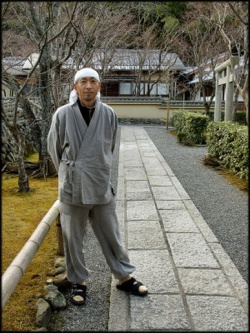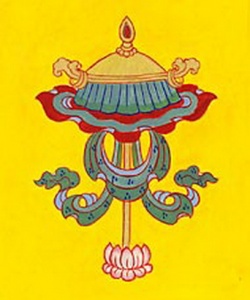The Satori Q and A
Question: What is meant by "satori" (C. Wu)? I realize that it usually means "enlightenment", but I am still having a difficult problem with its definition.
Answer: Usually the tentative definition of satori is stated to be the direct experience of realizing the nature of Mind, this being the same as our Buddha-nature.
Question: What do you experience in satori?
Answer: Strictly speaking, satori is not actually what you might call an experience. By definition, experiences are always temporal and sensible. On the other hand, seeing Mind's nature is not something temporal or sensible. So how can it be experienced? And if we assume that the experience of Mind's nature agrees with sensory experience, then how are we to acquire confidence in our satori, given the inadequacy of sensory knowledge, which is always changing? Truthfully, satori is not an experience.
Question: Then what you are saying, is that satori is not a kind of sensory experience. But without the use of the senses, how do we arrive at the realization of Mind's nature and have satori?
Answer: In order to have satori, we must not be apart from Mind's nature. While our senses must remain consciously apart from their corresponding sensory objects in order to perceive them, satori demands immediate participation with the foundation of all realities, namely, the nature of Mind.
Question: Let me get this clear in my own mind. Are you saying that genuine satori participates directly with Mind's nature, rather than being conscious of it? If so, then what does satori comprehend?
Answer: To answer one part of your question, the answer is yes; satori is participation with Mind's nature. When we have the proper satori of Mind's nature, henceforth, we will become identical with Mind's nature. It is like water flowing into water. Finally, to answer your last question as to what satori comprehends, all that I can say is that to realize the nature of Mind is to see the obvious. In fact, we discover that we have been using Mind's pure nature all of our lives! Were it not for this nature, we would have never, in the past, been able to seek the truth of Mind, as paradoxical as that sounds.
Question: What it is like, belonging to Mind's nature?
Answer: To answer your question is impossible, because such a nature has no 'likeness'. There is nothing in the universe that is like it. Belonging to Mind's nature is independent of likeness. What I am saying is that whatever we might imagine Mind's nature to be like, it is not that. We simply cannot use conventional ways of looking at this mysterious nature. Being unbounded it has no dimensions. Being free from mental images, how can we even imagine it? And being silent, how can it be spoken of?
Question: Is satori the highest state of enlightenment?
Answer: In many ways, it is just a catchall word. Technically speaking, the satori of a Buddha is much different than, let us say, the satori of a beginner. What I have been talking about thus far, is advanced satori.
Question: What is satori like for a beginner?
Answer: I guess for a beginner, satori might be called an "interpretative insight". The beginner might come to a small insight over the question, "Where would you be if your bones were returned to your father and your flesh to your mother?" But again on further reflection, the beginner might not be able to understand what made the founder of Zen Buddhism, Bodhidharma, go to China or understand what is the meaning of a Zen shout. Until beginners belong to Mind's nature, letting go of every preconceived idea, they will have successes some times and failures at other times, trying to understand the mystery of Zen. But in the long run, a beginner's wisdom will always be incomplete because they have not awakened to the principle of Buddhism itself, which is beyond perceptions.
Question: What should beginners do to attain their first authentic satori?
Answer: Traditionally, Zen masters tell their students to make an attempt at perceiving what is beyond all mental impressions. In a word, to penetrate through the veil of your mental pictures, seeing their true content.
Question: Is this like stopping all thinking?
Answer: No. That would be the wrong state, being merely the fourth dhyana (J. zenna). If you stop there, you will fall into a miserable state of being, thinking that you have attained sainthood. If you don't believe me, then read about the fifty false satoris in the Shurangama Sutra. Indeed, some Buddhists fall into one of the fifty false enlightenments, thinking they have become enlightened by seeing Vairocana Buddha, for example, standing in front of them. Some imagine they are enlightened by entering into voidness. Some even imagine that enlightenment is to be able to make the Five Aggregates immortal!
Question: I gather from what you are saying, that stopping thoughts is all wrong. Are you suggesting that these false fifty states are just subtle perceptions and that we must go beyond them?
Answer: Well said! As one Zennist put it, "If you see the Buddha, slay the Buddha!" If your satori is anything perceptible, it is not genuine satori. If you go into a trance, or feel blissful-this is not satori, because you are perceiving something. We should never forget that our fundamental Buddha-nature is here, presently. So we must conclude that all these other states are just wishful thinking, part of our productive imagination.
Question: I think I understand what you are saying. But I have read the accounts of other Buddhists having visions of Buddhist deities, who give them teachings. Is that false?
Answer: Again, according to the Shurangama Sutra, these deities emanate from Mara, who is a kind of Buddhist devil. But actually, he just symbolizes our mortality. It is not that these deities are bad in themselves, it is just wrong to become attached to them, thus stopping short of the goal. With regard to the teachings these deities give, they only point to false enlightenments. True satori, in a manner of speaking, just reveals our nose that we once thought had disappeared. How, therefore, can a deity reveal what you have never lost or point to that which is already yours? But having said this, satori also liberates us from the wheel of birth and death, since we have become the one who now turns the wheel, instead of the one who follows it!


